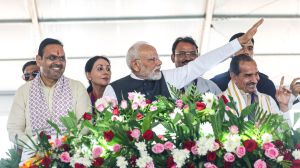Stay updated with the latest - Click here to follow us on Instagram
Biomass energy policy on the cards to meet rising needs
In an attempt to meet the increasing energy needs in Gujarat,especially in rural areas,the government is likely to soon come up with a biomass energy policy.
In an attempt to meet the increasing energy needs in Gujarat,especially in rural areas,the government is likely to soon come up with a biomass energy policy. Gujarat will be the third state to have such a policy after Tamil Nadu and Andhra Pradesh.
The Gujarat Energy Development Agency (GEDA) a government body set up to promote renewable and non-conventional energy resources in the state has prepared a draft policy and submitted it to the government for approval.
Minister of State for Energy Saurabh Patel told The Indian Express on Monday that the government was considering the draft policy. But,since the two-day Assembly session has been summoned,the government would make an announcement on the new policy only in the House.
There is tremendous potential in Gujarat for power generation through biomass,with several private companies from Gujarat as well as other States evincing keen interest in setting up biomass-based electricity generation projects in our state. In fact,some of them have even inked Memoranda of Understanding (MoU) with the government for this,proposing to produce about 400 MW, the minister said.
Sources in the GEDA say though the government will not offer any cash subsidy or other incentives to private entrepreneurs for setting up the plants in the state,the draft policy has been worked out in such a way that they will be encouraged to establish their projects in this otherwise untapped sector.
Initially,we have set the target of producing about 1,000 MW of electricity through this renewable source in Gujarat. The government will encourage private companies to set up small biomass power units of the capacity ranging between 10 MW and 50 MW, said a source,adding that the GEDA would act as both the facilitator and regulator.
The main sources of biomass energy are agricultural residues,wood waste and prosopis (locally known as gando baval),which is available in abundance in Gujarat,particularly in Saurashtra,Kutch and north Gujarat. The crop residues to generate biomass electricity could be availed mainly from cotton stalks and groundnut shells,as also from sugarcane.
In the draft policy,the Gujarat Urja Vikas Nigam Limited (GUVNL) will purchase biomass power from private companies and put it into the GUVNL grid,mainly in its rural feeders to cater to the electricity needs of farmers and rural artisans engaged in cottage industries. Private firms will also be allowed a captive use of power to be generated from biomass.
A GEDA official said the estimated biomass power production cost is Rs 5 crore per MW,against the cost of Rs 5.50 to Rs 6 crore per MW of the electricity being generated by any coal-based project.







